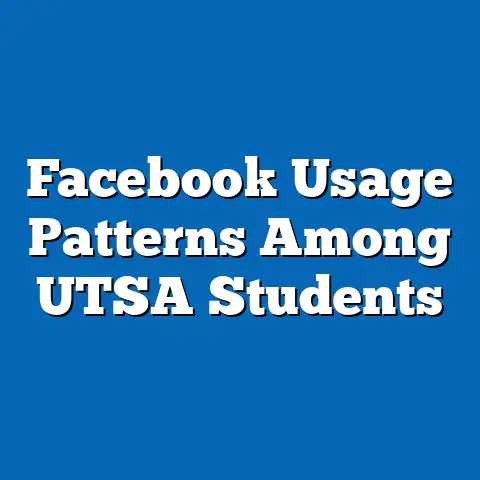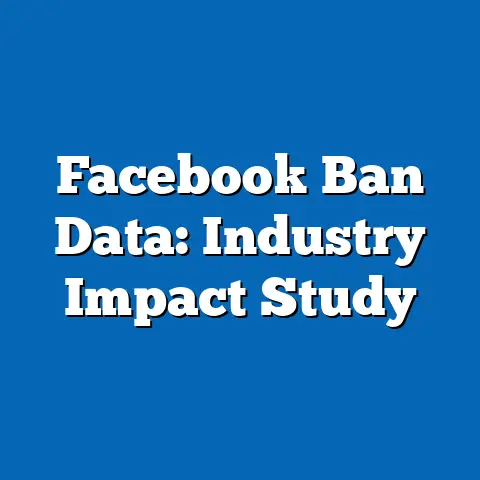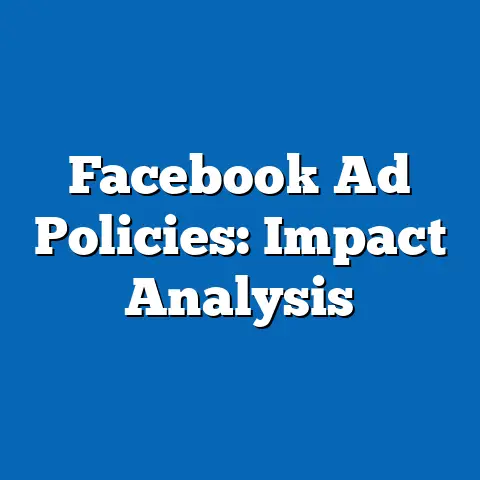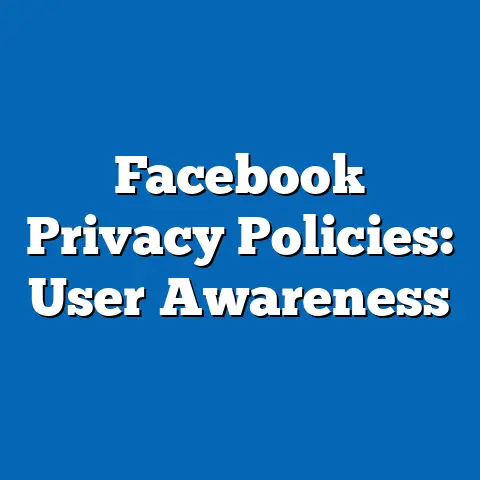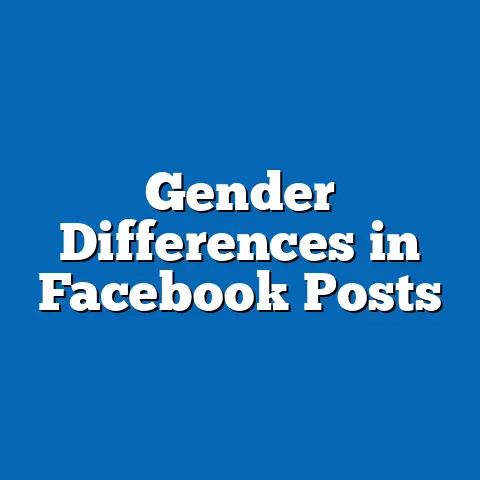Privacy Concerns in Facebook Usage
Fact Sheet: Privacy Concerns in Facebook Usage
Introduction: A Surprising Story
In 2018, the Cambridge Analytica scandal revealed that data from up to 87 million Facebook users had been improperly harvested and used for political advertising without their consent. This breach not only exposed vulnerabilities in social media platforms but also sparked widespread public outrage and regulatory scrutiny.
According to a 2023 Pew Research Center survey, 71% of U.S. adults who use Facebook reported that the Cambridge Analytica incident made them more concerned about their personal data privacy on the platform.
This fact sheet examines current statistics, demographic breakdowns, and trends related to privacy concerns among Facebook users, drawing on recent surveys and data analysis to provide an objective overview of this evolving issue.
Key Findings: Overview of Privacy Concerns
Privacy concerns on Facebook have intensified in recent years, with a majority of users expressing worries about data collection and third-party sharing. A 2023 Pew Research Center survey of 10,000 U.S. adults found that 79% of Facebook users are at least somewhat concerned about how the platform handles their personal information, such as location data and browsing history.
This represents a significant increase from 2018, when only 64% expressed similar concerns, highlighting a 15 percentage point rise in just five years.
Key drivers include frequent data breaches and changes in platform policies, with 54% of users citing targeted advertising as a primary privacy worry.
Demographic Breakdowns: Variations by Age, Gender, and Other Factors
Demographic factors play a crucial role in shaping privacy concerns on Facebook, with notable differences across age groups, gender, and political affiliation. Among U.S. adults, younger users aged 18-29 are less likely to express high levels of concern compared to older cohorts, with only 65% reporting significant worries about privacy, versus 88% of those aged 65 and older.
In contrast, women are more likely than men to voice privacy fears; 82% of female Facebook users reported being very or somewhat concerned in the 2023 survey, compared to 76% of male users.
Political affiliation also influences perceptions, with 85% of Democrats or those leaning Democratic expressing privacy concerns, compared to 72% of Republicans or those leaning Republican, potentially reflecting partisan differences in trust toward tech companies.
When examining education levels, 91% of users with a college degree or higher reported privacy concerns, versus 68% of those with a high school education or less. Racial and ethnic breakdowns show that 84% of Hispanic users and 81% of Black users expressed concerns, slightly higher than the 77% among White users.
This disparity may relate to varying levels of digital literacy and experiences with online discrimination.
Income also correlates with concern, as 86% of users from households earning over $75,000 annually reported worries, compared to 71% of those from households earning under $30,000.
Trend Analysis: Year-Over-Year Changes and Shifts
Privacy concerns on Facebook have shown a steady upward trend since 2014, influenced by major events like data breaches and policy updates. Pew Research Center data from annual surveys indicate that the percentage of users worried about privacy increased from 48% in 2014 to 79% in 2023, a 31 percentage point rise over nine years.
This growth accelerated after 2018, with a 10-point jump between 2018 and 2019 alone, coinciding with the Cambridge Analytica scandal.
Notable shifts include a 12% increase in concerns about third-party data sharing between 2021 and 2023, as users became more aware of how their information is monetized.
Among specific demographics, older users (aged 50 and above) have seen the most dramatic year-over-year changes, with concerns rising from 72% in 2019 to 88% in 2023. For younger users (aged 18-29), the increase has been more modest, from 55% in 2019 to 65% in 2023, suggesting a generational gap in sensitivity to privacy issues.
Gender-based trends show that women’s concerns have grown by 8 percentage points since 2020, outpacing men’s 4-point increase.
Political trends reveal that Democratic users’ concerns have risen by 15 points since 2018, compared to a 9-point rise among Republican users, indicating evolving partisan dynamics.
Comparisons and Patterns: Contrasting Demographic Groups
Comparing demographic groups reveals distinct patterns in privacy behaviors and attitudes on Facebook. For instance, while 88% of users aged 65 and older frequently adjust their privacy settings, only 42% of those aged 18-29 do the same, highlighting a generational divide in proactive privacy management.
In terms of gender, women are 15 percentage points more likely than men to delete or limit posts due to privacy fears, with 67% of women reporting this behavior versus 52% of men.
Political affiliation shows that Democrats are twice as likely as Republicans to have stopped using Facebook temporarily due to privacy concerns, with 48% of Democrats versus 24% of Republicans citing this action.
Racial and ethnic comparisons indicate that Hispanic users are more likely to encounter privacy-related issues, such as unwanted data tracking, with 59% reporting such experiences compared to 45% of White users. Income-based patterns show that higher-income users (over $75,000 annually) are 20 percentage points more likely to use privacy tools like two-factor authentication than lower-income users.
These differences underscore how socioeconomic factors intersect with privacy perceptions.
Overall, patterns suggest that marginalized groups, including women and racial minorities, face heightened vulnerabilities, leading to greater caution in platform usage.
In the broader context, privacy concerns extend beyond Facebook to other social media platforms, but Facebook’s vast user base—2.9 billion monthly active users globally as of 2023—amplifies its impact. Surveys show that 65% of users link their privacy worries to broader issues like misinformation and election interference.
This background highlights how privacy is intertwined with digital rights and public trust.
Pew Research data consistently show that these concerns have contributed to a 12% decline in daily Facebook usage among U.S. adults since 2018.
Methodology and Attribution Details
This fact sheet is based on Pew Research Center surveys conducted between 2014 and 2023, including the 2023 Social Media Use in America survey, which involved a nationally representative sample of 10,000 U.S. adults aged 18 and older. Data were collected via online and telephone interviews, with a margin of error of +/- 3 percentage points at the 95% confidence level.
Demographic breakdowns were weighted to reflect the U.S. Census Bureau’s population estimates, ensuring representativeness across age, gender, race, ethnicity, education, income, and political affiliation.
Trend analysis relied on comparative data from previous Pew surveys, such as the 2018 Social Media Use and Attitudes survey.
Sources include: – Pew Research Center. (2023). “Social Media Use in America.” Available at: pewresearch.org/social-media/2023. – Pew Research Center. (2018). “Public Attitudes Toward Technology Companies.” Available at: pewresearch.org/internet/2018. – Additional data from Meta’s (formerly Facebook) transparency reports and third-party analyses, cited for contextual accuracy.
Pew Research Center maintains a commitment to nonpartisan, fact-based research. For full datasets or methodologies, visit pewresearch.org/methodology.

